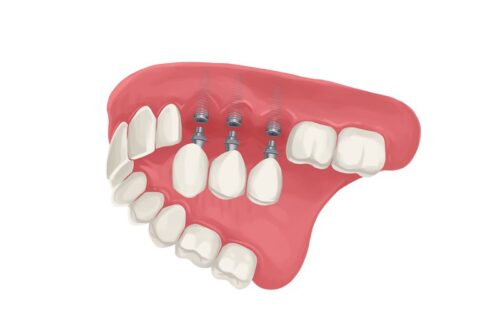Losing a molar might not seem like a big deal at first—it’s tucked in the back, after all—but those big chewing teeth do a lot of heavy lifting. Without one, you might notice it’s harder to enjoy a steak, chew nuts, or even bite evenly. Over time, that single gap can start a chain reaction: the surrounding teeth may drift into the empty space, changing your bite and sometimes leading to jaw discomfort or uneven wear.
At Fielder Park Dental in Arlington, we often help patients facing the same question: Should I replace my missing molar with a dental implant or a denture? Both can restore your smile—but they do it in very different ways.
Dental Implants: A Strong, Steady Solution
Think of a dental implant as a replacement tooth root. It’s a small titanium post placed into your jawbone, topped with a custom crown designed to look—and feel—just like the real thing.
Implants are incredibly sturdy and can handle the full pressure of chewing, which makes them especially ideal for molars. Even better, they help keep your jawbone healthy by stimulating it, just like a natural tooth root would. That means no bone shrinkage and no sagging in that area over time.
Implants take a little longer to complete since the bone needs time to heal around the post, but once in place, they can last for decades. For many patients, it’s a “forget it’s even there” kind of fix.
Partial Dentures: A Practical, Flexible Option
For patients looking for something non-surgical or more budget-friendly, partial dentures can still be a great choice. These removable appliances are custom-made to fill the space of missing teeth and clip onto your remaining ones for support.
They help restore your smile and improve chewing function, but they don’t anchor into the bone like implants do. That means the bone under the missing molar can gradually shrink, which sometimes causes dentures to loosen or need adjustments.
Still, modern partials are lighter, more natural-looking, and more comfortable than ever. For some patients, they’re a smart stepping stone before transitioning to implants later on.
So, Which Is Better for a Missing Molar?
If you want something permanent that feels closest to your natural tooth, a dental implant usually wins. It preserves bone, restores full chewing power, and doesn’t move or shift.
If you’d rather avoid surgery or are replacing multiple teeth at once, a partial denture might fit your needs better. What’s most important is choosing a solution that fits your goals, lifestyle, and comfort level—not just your budget.
Finding the Right Fit at Fielder Park Dental in Arlington, TX
At Fielder Park Dental, our team understands that every smile—and every patient—is unique. We’ll take time to discuss your options, explain what to expect, and help you choose what works best for you. Whether you’re leaning toward an implant or a denture, we’ll make sure you feel confident about your decision every step of the way.
If you’ve lost a molar or are thinking about replacing one, we’d love to help you get your bite and confidence back. Call our Arlington office today to schedule a consultation and take the next step toward a stronger, more comfortable smile.
Image from Authority Dental under CC 2.0

